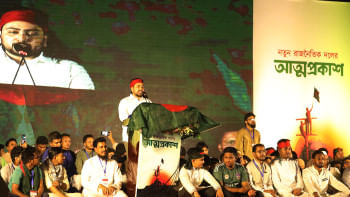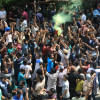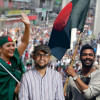When change agents become the status quo

Last year, the Students Against Discrimination (SAD) platform stood as the moral engine of a historic moment. It united a restless generation and, for a brief moment, people of all ages found hope in its banner as students shook the foundations of a draconian political order. The July-August uprising in 2024 promised more than a revolt. It promised a new kind of politics that placed conscience above opportunism. Unfortunately, that same banner now stands smeared by scandal. Over the past week, several SAD-affiliated leaders were arrested for allegedly demanding Tk 50 lakh from a former AL MP's family in Gulshan, and it was later discovered that they also pressured another former MP into signing cheques worth crores. These are not petty lapses. They go to the core of what gave SAD its moral legitimacy.
Since this development, SAD has expelled the accused and dissolved all of its committees across the country, except for the central committee. Former leaders, including Umama Fatema, have said that this is not an isolated incident but the product of a culture that tolerated closeness to power without accountability. This is not the first such allegation. It is, however, the first time the rot has broken through the surface for everyone to see.
Accountability must also extend to the National Citizen Party (NCP). NCP emerged from SAD, yet when it transitioned into a political party, it left SAD intact, creating two overlapping structures that blurred the line between civic movement and party machinery. That choice was not prudent. It allowed SAD to drift on as an unregulated network while its most notable organisers moved into positions of influence inside NCP. Now that NCP holds significant political clout in the post-uprising political landscape, it cannot simply wash its hands of SAD's misdeeds. These incidents are not isolated; rather, they are the predictable outcome of a culture of informal power, favour-trading and access that NCP appears to have tolerated and, in practice, legitimised. To pretend the two are separate is to deny responsibility for the very decay that has now come back to stain them both. The trend of abusing power is not restricted to SAD, NCP, or affiliated organisations, however, with grassroots leaders of major political parties like BNP often engaging in similar crimes.
Max Weber, in his famous lecture "Politics as a Vocation," argued that politics demands three virtues: passion, responsibility, and judgement. When passion is left without the discipline of responsibility, it curdles into vanity. Vanity feeds on the thrill of power, the privilege of access, and the self-importance that influence brings. The Gulshan extortion case makes this lesson painfully clear. Passion that once drew a generation together has, when left unchecked, turned inward, away from purpose, and towards ambition. These young leaders did not simply break the law; they broke the covenant that sustains every serious political movement. This is not a matter of a few bad actors. It is the direct result of a movement that failed to cultivate a culture in which passion is anchored by responsibility.
Isaiah Berlin adds another warning. In The Sense of Reality, he wrote that political judgement is not about applying formulas but about reading the texture of a moment. The hardest test comes after the banners come down, when the fire of protest must be replaced by the discipline of building institutions. SAD's leadership has stumbled here. They behaved as if last year's tactics—with their reliance on informal authority, rapid mobilisation, and easy access through banners—could remain unchanged after the uprising. They failed to see that once the moment of revolt ends, legitimacy no longer flows from the street but from a disciplined organisation. When a movement cannot make this shift, its energy leaks into the hands of opportunists. The Gulshan scandal and earlier incidents—one where SAD activists assaulted a businessman in Mirpur, and another, where 14 SAD members were sent to jail for extortion and vandalism in Kalabagan—are the cost of that failure. Instead of recognising that their movement demanded institution-building, they continued to live off the moral credit of July as if it were inexhaustible.
Social movement scholars Francesca Polletta and Beth Gharrity Gardner remind us that movements live and die by the stories told about them. Stories give meaning to sacrifice, bring diverse people together, and inspire allies. But when the story changes, trust collapses. The Gulshan incident is already replacing the story of a brave generation with another story. And once a movement loses control of its story, it loses its greatest resource. Numbers and access can be rebuilt, but moral credibility, once lost, is almost impossible to recover. If SAD's leaders treat these events as a passing lapse, they risk letting others write their final chapter. A public that once stood with them will see only another group seduced by the temptations of power.
Rebuilding trust will take more than expelling a few names, however. It requires a cultural reset. SAD needs an independent process to investigate wrongdoing, a clear and public code of ethics, and proper leadership training. Moreover, NCP must not be allowed to stand apart as if it has no role to play in this. NCP is not a bystander here. It has benefited from SAD's rise and must answer for the structures it created but never controlled. Without this reckoning, these organisations will be remembered not for the hope they once inspired, but for how quickly they fell into the same habits of the system that they had set out to challenge.
Bangladesh cannot afford to see another generation's idealism fade into cynicism. For SAD, as well as for NCP, this is a moment that will define their legacy. If they confront what has gone wrong, they may still reclaim the promises of July. If they turn away, they will lose the trust they inspired, and the banner that once stood for hope will be remembered only as a warning of what happens when a movement forgets why it was born.
Dr Kazi ASM Nurul Huda is associate professor of philosophy at the University of Dhaka. He can be reached at [email protected].
Views expressed in this article are the author's own.
Follow The Daily Star Opinion on Facebook for the latest opinions, commentaries and analyses by experts and professionals. To contribute your article or letter to The Daily Star Opinion, see our guidelines for submission.

 For all latest news, follow The Daily Star's Google News channel.
For all latest news, follow The Daily Star's Google News channel. 











Comments